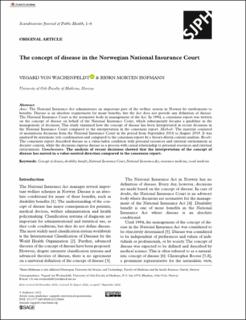The concept of disease in the Norwegian National Insurance Court
Peer reviewed, Journal article
Published version
Permanent lenke
https://hdl.handle.net/11250/3061396Utgivelsesdato
2022Metadata
Vis full innførselSamlinger
Sammendrag
Aims:
The National Insurance Act administrates an important part of the welfare system in Norway by entitlements to benefits. Disease is an absolute requirement for many benefits, but the Act does not provide any definition of disease. The National Insurance Court is the normative body in management of the Act. In 1994, a consensus report was written on the concept of disease on behalf of the National Insurance Court, which subsequently became a guideline in the management of decisions. This study examined how the concept of disease has been interpretated in recent decisions in the National Insurance Court compared to the interpretation in the consensus report.
Methods:
The material consisted of anonymous decisions from the National Insurance Court in the period from September 2018 to August 2019. It was analysed by systematic text condensation and compared to the consensus report by a theory-driven content analysis.
Results:
The consensus report described disease as a value-laden condition with personal resources and external environment as decisive context, while the decisions express disease as a process with causal relationship to personal resources and external environment.
Conclusions:
The analysis of recent decisions showed that the interpretation of the concept of disease has moved in a value-neutral direction compared to the consensus report.

